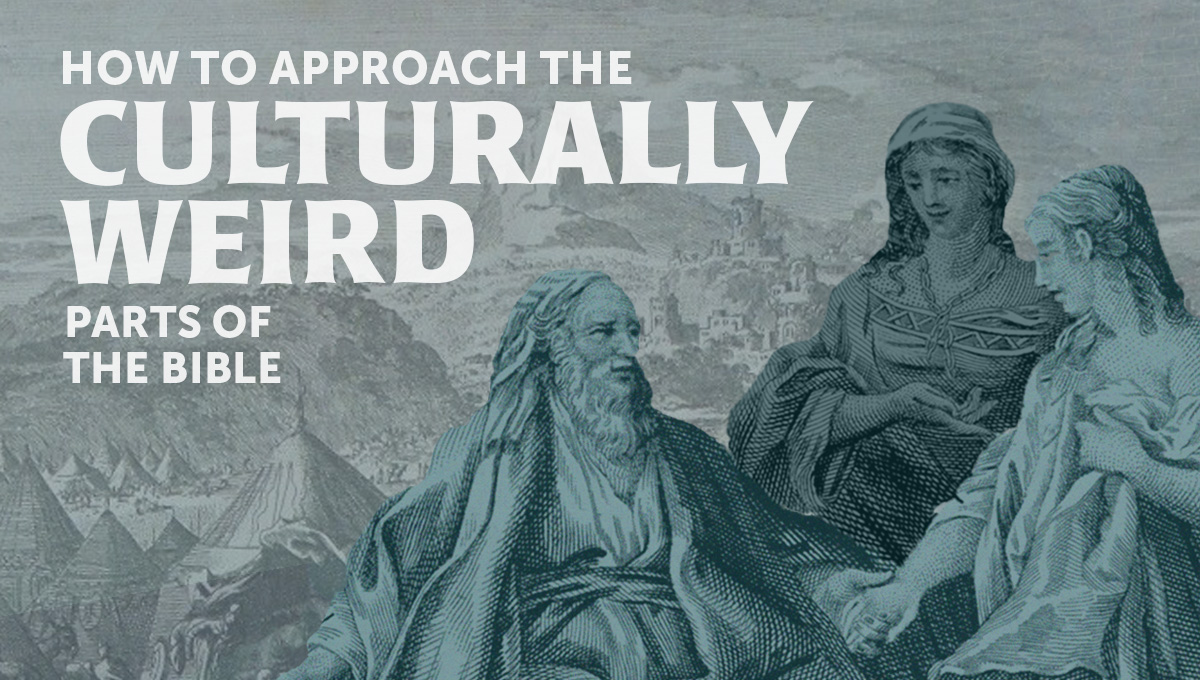Reading through the Book of Genesis can be challenging for a number of reasons. One that’s especially tough for modern readers is the amount of culturally weird, confusing, or even problematic moments we see in the early stories of the Bible.
Most of us respond in one of two ways: we either move past it, skipping ahead to a part that makes more sense. Or we stop and say, “Wait, what?” Then (if we’re honest) we judge the characters in the story– and even God– through the lens of our own system of values.
On one hand, this is a fair critique. People in the Bible are not perfect, and we are meant to learn from their negative examples as much as their positive ones. However, when we make assumptions about people (and their motives!) from another time and culture based on our twenty-first century, Western culture’s norms, we miss out on a lot we could learn from scripture.
I’ll talk more about the morality of some of these ancient practices later in this post, but first I want to acknowledge the historicity of these strange, often offensive details included in Genesis. Here are some ways to approach those culturally weird parts of the Bible.
“Wait, what?”: Abraham & Sarah
Let’s take the example of Abraham and Sarah (Abram and Sarai) in Genesis 11-23. What are some of the culturally weird parts of their story? Well…
- Sarah is Abraham’s half-sister (the daughter of one of Terah’s other wives). The law that God gives later actually forbids this kind of inter-marriage (Lev. 18:6-18, 20:17).
- Twice, Abraham passes Sarah (his wife) off as his sister (Gen. 12 and 20).
- Sarah, who’s barren, tells Abraham to sleep with her servant Hagar in order to beget children for their family line (Gen. 16).
- Abraham offers complete strangers some over-the-top hospitality (Gen. 18).
- Abimelech gives Abraham presents as a thank you for giving Sarah to his harem (the second time Abraham pretends she’s his sister and not his wife).
- The narrator goes into a ton of detail about the process of purchasing the burial plot for Sarah from the Hittites (Gen. 23).
Placing the Story in History
A hundred years ago, historians knew almost nothing about the ancient Hittites. They didn’t even know such a people group existed apart from biblical accounts. Today, there is a vast amount of knowledge available about the Hittites and other people who inhabited the land in which Sarah and Abraham were nomads.
All the details in the Bible fit into what we’ve learned through archeological research about that ancient culture. Inter-marriage, harems, use of concubines to shore up genealogical lineages, the status-reflecting value of generous hospitality — it’s all consistent with today’s historical evidence about the Hittite people. So even when Abraham and Sarah were disobeying God, they did so in ways that were culturally acceptable at the time. I think we can all relate to that!
As weird and challenging as some of these details are for us as modern readers, they’re the kind of details that place these stories in a real setting—time, place, context, supporting cast of characters.
God’s story unfolds in the present, often-messy, reality of human history. We can (and should) still ask questions about the morality, wisdom, and “whys” of what was going on. But it’s foolish to judge these specific cultural moments through the lenses of our own culture’s values and preferences. This is a logical fallacy known as chronological snobbery.
The Cost of Wrong Conclusions
Another issue we run into when we’re super judgey about the Old Testament is coming to untrue conclusions about God. We see sin, brokenness, or culturally weird things in Scripture. And we assume that– because these details are not explicitly condemned– God must be condoning (or even commending) them.
Instead, I want to invite you to assume the best about God.
Think about what you know of him and his character. Reflect on what he explicitly condemns and commends elsewhere in Scripture. Then use this knowledge to think critically about your interpretation of whatever story is before you. God is consistent. If something seems off, it might be your understanding of what’s going on.
Moving Forward with OT Study
Here’s a helpful principle to hold on to as you read biblical narrative:
The inclusion of information in a story doesn’t mean it’s good. It means it happened.
Sometimes…
- …we are told explicitly that something is good or bad by the narrator.
- …a character within the story gives us insight into how we should think.
- …no one comments on the situation directly but we figure out whether it was good or bad by the way the consequences play out
- …the readers are expected to use what we know about God in general to reach the correct conclusion about something
Our Role in God’s Story
We as readers are participants in God’s story. We are expected to do some work on our end to fill in “gaps” in the narrative. Part of why studying all of the Bible is so important is that it gives the background knowledge we need to interpret scripture correctly. In this digital age, the media we consume rarely asks us to work this hard. But, to be fair, the results of our effort are rarely as fruitful.
Understanding the culturally weird parts of the Bible helps us to know and understand God better. The Bible can also help us understand our world better. Find out how the Bible relates to science in the post below.
